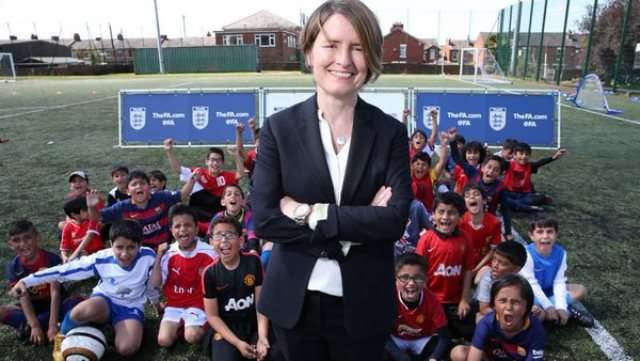by Kieran Thievam
FA director of development and participation Kelly Simmons says 2015 felt like a year that the nation “fell in love with the Lionesses” and admits that, as a result, the organisation is now reviewing its five-year strategy.
After England‘s colossal effort in winning a bronze medal in Canada last year, along with more coverage of the women’s game in this country, Simmons revealed she and her team have been “pleasantly surprised” by how much the nation has got behind the national team.
This success helped grow attendances in the FA Women’s Super League by 48 per cent last year and saw 18,000 youngsters attend the FA’s women’s football week in October.
In addition, there has been an increase in interest at grass-roots level, with more affiliated teams launching.
Simmons said: “We’ve definitely seen an increase in participation, with county FAs saying to us that they’ve been inundated with clubs and leagues interested in starting a women’s and girls’ section, which is great. And we’re working to capitalize on that.
“But we know there is a lot to do and that is a focus in the new strategy.”
It was in 2012 that the FA introduced its ‘Game Changer’ five-year strategy to run between 2013 and 2018, with the aim of achieving goals such as a two-tier FA Women’s Super League and an increase in broadcast coverage.
Simmons admits that due to the phenomenal year that women’s football had in 2015 she, along with chief executive Martin Glenn and the FA’s directors, are now reviewing that strategy ahead of schedule.
“We are re-evaluating it now, but it is early days,” she said.
“We will be consulting our key stakeholders, but we certainly want to build on the World Cup success and to continue to develop the FAWSL, gaining bigger crowds and interest.
“In addition, increasing the player pool will be a key focus of the new strategy because we want to continue competing at the top level and featuring in the latter stages of major tournaments.”
Building on attendances is likely to come down to a number of factors, none more so than changing the attitudes of some who see the women’s game as lacking entertainment or, quite simply, that women don’t belong on the football field.
Thankfully, with record crowds at individual grounds at the likes of Manchester City Women and Chelsea Ladies last year, it would appear those outdated views are changing.
“There has definitely been a shift in attitude and you can see that with things like the attendance at the FA Cup Final at Wembley (over 30,000), but I still think there is a lot of work to do,” said Simmons.
“We did some interesting research before the World Cup, which revealed that dads are less likely to encourage their girls to play football than their boys, and girls, although they love football, are not sure it’s a sport for them because of the cultural barriers.
“But the Lionesses’ success helps to shatter some of those issues.”
Coming into 2016, the FA faces arguably its biggest challenge since trying to build on Team GB’s participation at the London Olympics in 2012.
With no major tournament for the home nations to participate in this year after an agreement could not be reached over the Rio Olympics, the football governing body will now have to find other ways to attract new fans, while catering for their existing ones.
While she admitted that it was “bitterly disappointing” that there would be no team at the Olympics, Simmons is confident that this year will see the women’s game continue to develop.
She concluded: “We have a number of Euro qualifiers for England and the Women’s FA Cup Final will return to Wembley, which is a big showpiece opportunity.
“UEFA has helped bring the bigger countries together that are moving from semi-professional to professional women’s football, so we come together quite regularly to learn from each other, which I think is really important.
“We still have some big landmark moments, and while I think not being at the Olympics is a huge missed opportunity, we do have the Women’s Super League to build the profile of the game on.”
If 2016 does turn out to be anything like 2015, then Simmons won’t be complaining.
















